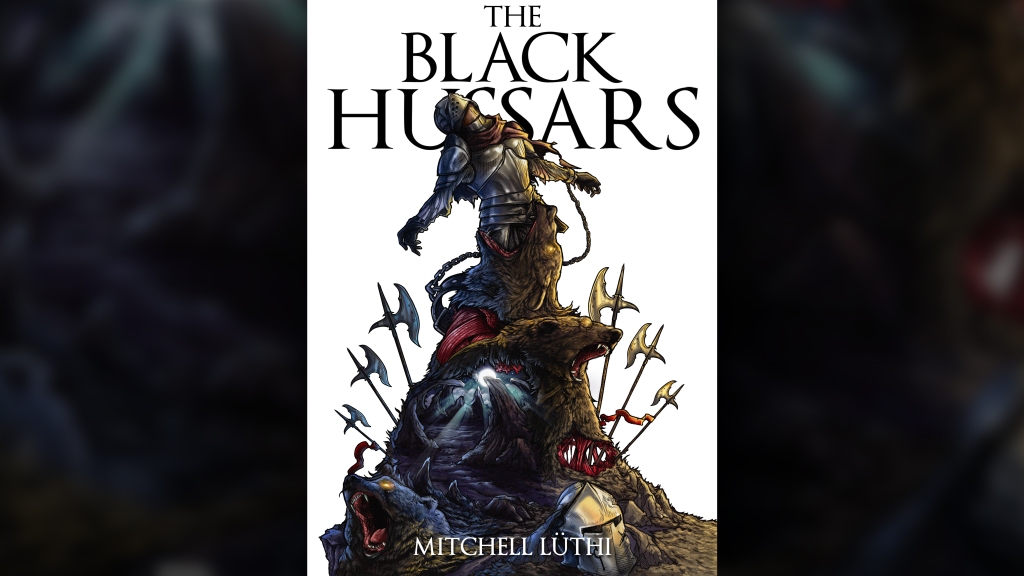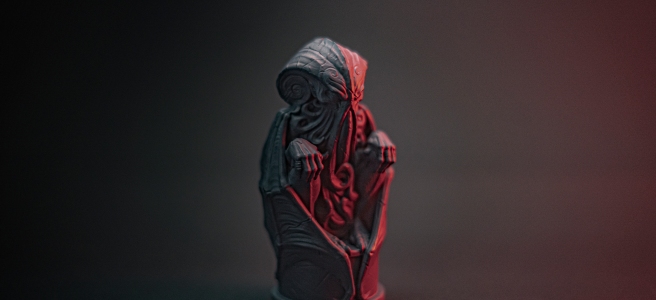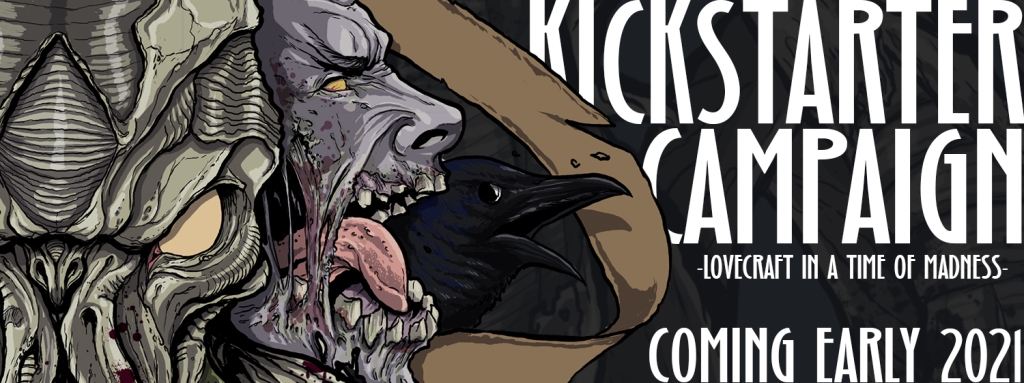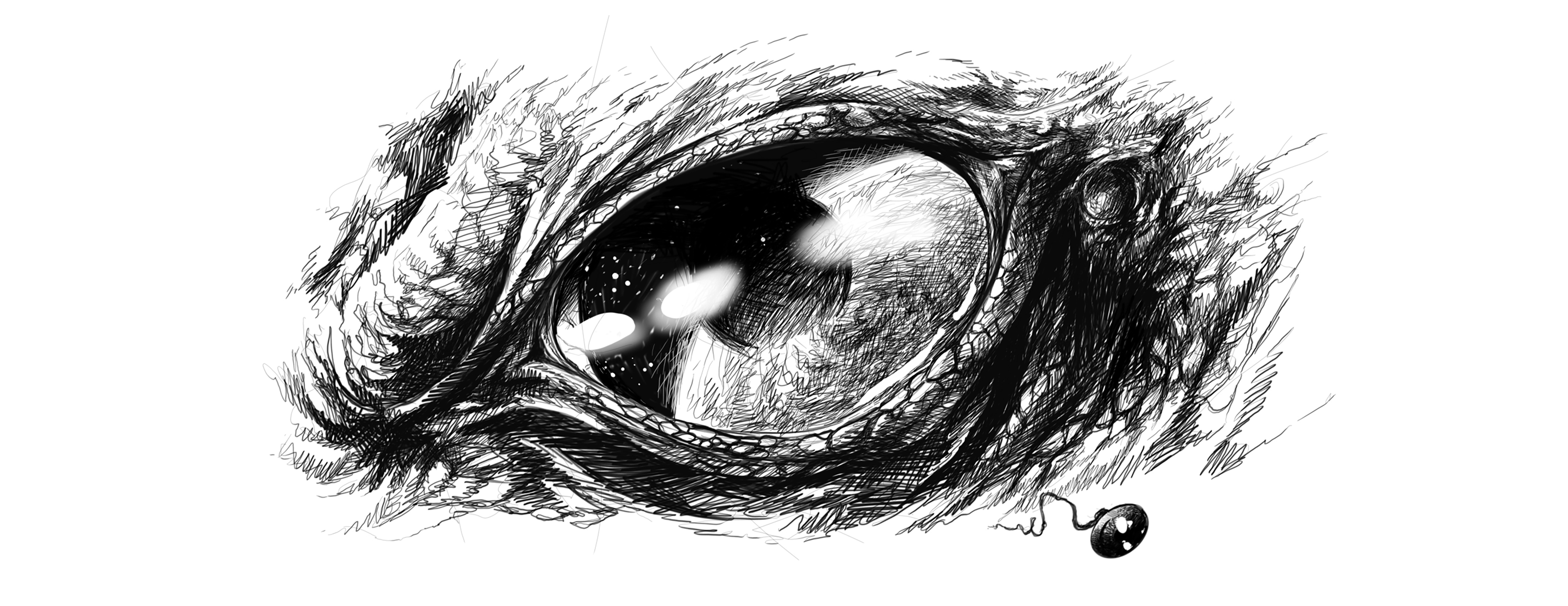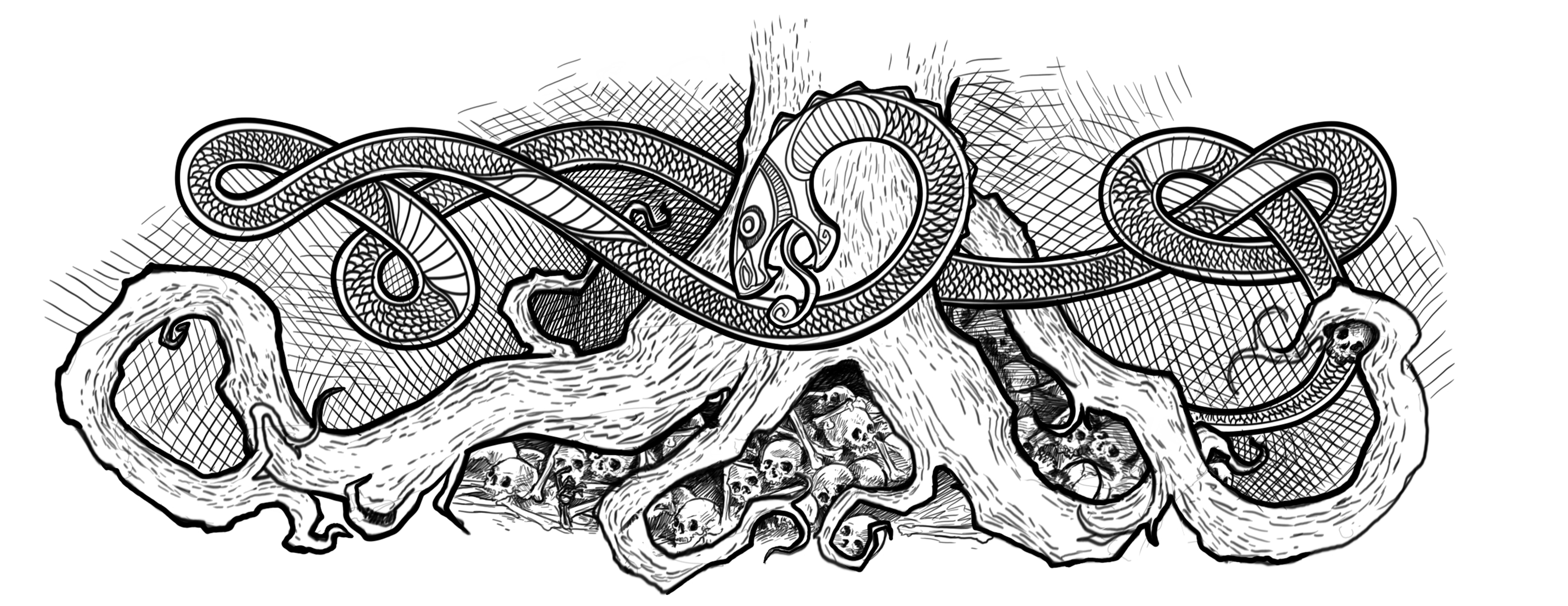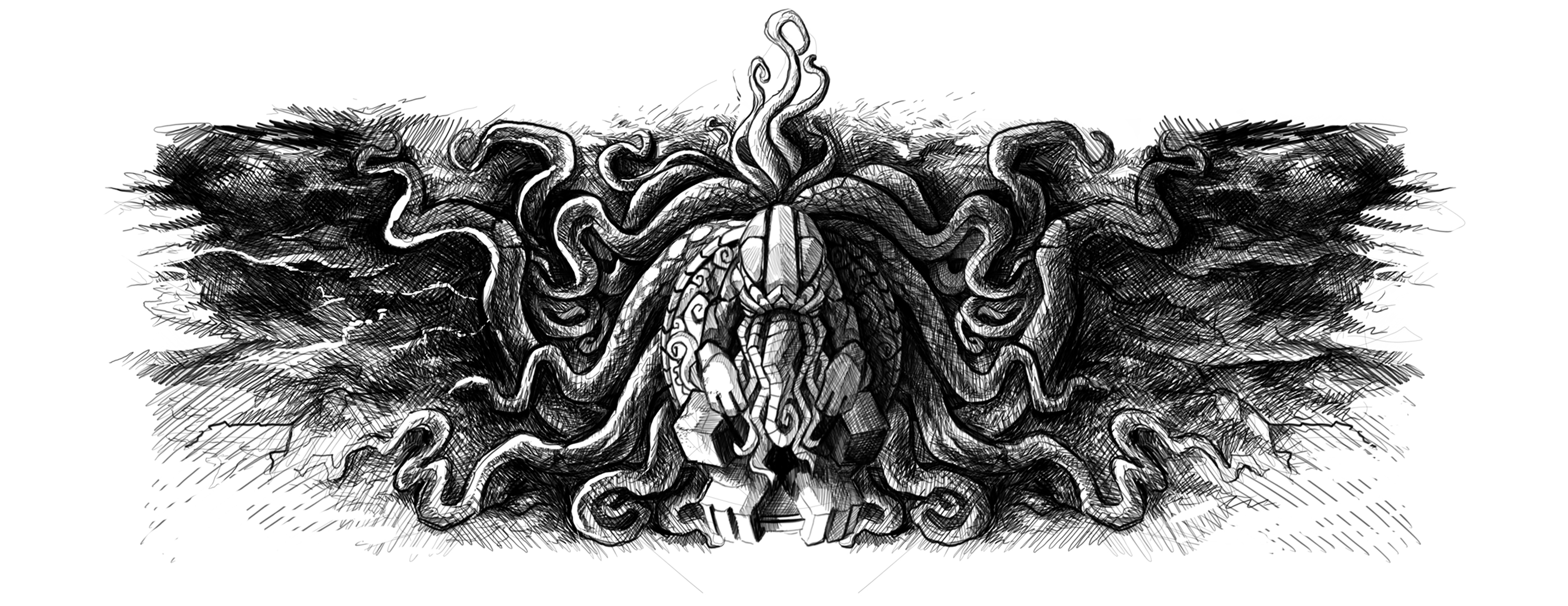HIS BLACK TONGUE
by Mitchell Lűthi
1349
A young man had become possessed by a devil. The thing within him burst into loud lamentation and departed from the man. At once the youth’s eye fell out on his cheek, and the whole of the pupil which had been black became white.
Saint Augustine
Rain fell that day from clouds that scarred the sky like bruises on a newborn’s skin. It washed away the dust, and the rot, and the smell that lingered over Val de Havre, a thin strip of land somewhere north of Reims. It had been a plague year. As had the year before it and the year before that, too. What the rain couldn’t sweep away, the mud claimed. And its tithe was a handsome one, this year, the year of plagues.
In the centre of the valley, jutting out of the soil like freshly unearthed bones, lay the town of Enfaire. It was a small town, built the previous century, with high walls to repel Englishmen, and deep wells to survive siege. Spindly towers peeked out from behind its ramparts, facing the wooded hillsides that surrounded the valley like the gnarled tips of a ribcage around the sluggish heart within.
On the edge of the valley, beyond the empty fields that surrounded Enfaire, a shadow peeled off from the forest. It moved quickly, keeping ahead of the gathering storm clouds, and slipped onto the muddied road just as a bell began to toll out from within the town.
As it grew closer, the shadow became recognisable as a pair of silhouettes and then as the figures of a tall, gangly man and a younger woman. The woman wore a simple blue coat over a padded tunic and carried a walking staff in her one hand, while her other was wrapped around a small shoulder bag. The man moved with a slight limp and muttered beneath his breath as he tried to keep up.
Pierre Dubois was not a young man. And hadn’t been one for a very long time. His face was creased with lines, from years of happiness, and sadness, from days of too much sun and too little. He wore his grey hair clipped short, and a well-kept beard framed his jaw.
“This is it then, eh?” Pierre let out a steaming breath and leaned against his own walking stick to stare at the town. “Those gates have a decided look about them, Remi. What shall we find behind them, I wonder? Another tomb sealed in the names of Pestilence and Death?”
Remi shrugged, walking ahead of him. “There is no sickness here.”
“So they say, so they say.” Pierre wiped his nose and looked up as the first drops of rain began to fall. “Would that the absence of Pestilence were so inextricably bound to the absence of Death. But I fear that is not the case. One may still reside in a place where the other does not!”
“It’s either that or the storm,” said Remi. She turned back on the road, tugging her hood over her hair as rain pelted the mud around them. “These fields will be flooded by morn, and us drowned in them if we stay outside. So, a hearth and roof… or this stinking mire?”
“Ah! But for a roof over my head and a fire to warm my feet, I might be convinced to share a room with the Reaper,” said Pierre. “If only for a night.”
“And for a belly full of food?”
The old man laughed and trudged toward his companion. “For that, I would be tempted to dine with the Devil himself!”
Remi snorted and shook her head. “Sometimes I think you’d damn your own soul for a half-loaf of bread and a spoonful of honey, Pierre. I hope your faith will never be tested such… But I do not think the Devil waits for us in Enfaire.”
“No indeed,” said Pierre with a smile as they approached the town gate.
A shallow river framed the town’s eastern wall, running alongside the road like a serpent’s coils. The current was split by an island of stone and masonry, the one half disappearing through a sluice gate in the walls, while the other followed the road north, toward the edge of the valley. Its banks were already starting to overflow, and water flooded out onto the road, quickly turning it into a quaking mire.
Pierre and Remi hurried through the mud, slipping and sliding in the ooze as the first rolling booms of thunder split the sky. Pierre groaned miserably to himself as he braced against the rain, pulling his hood tighter around his neck until they finally took shelter beneath the gate’s stone overhang.
“Let’s see if anyone’s home,” said Pierre, with a glance to his companion. He rapped the head of his staff against the wooden gate and then huddled back against the wall.
After a brief pause, a small shutter slid open, and a yellow eye peered down at them from behind a meshed viewing port.
“What you want?” came a penetrating voice through the gate. The eye swivelled from Pierre to Remi and then back to Pierre and blinked. “Can’t you see the gates closed? The rot’s not welcome. No visitors!”
Pierre smiled up at the eye, drawing back his hood. “Our humble pardons, monsieur. We are simple travellers on our way to the Pilgrim’s Road. We seek no alms. Let not my designation of ‘Begging Friar’ dissuade you from that fact. We ask only for the safety and shelter of your walls and for a single night.”
The eye narrowed and blinked again. “Begging Friar? Franciscan?”
“Indeed. I am Pierre Dubois of Auvergne. And this is my charge, Remi of—”
“Just Remi,” said his companion, tilting her head.
“Auvergne? You’re a long way from home, Friar. And these roads aren’t safe anymore.” A furrowed brow appeared through the viewing port as the gatekeep swapped eyes. “Brigands, rapers, godless men, even those bastards from across the channel hound us here. And at night… Well, you’re lucky you got here before sunset.”
“So you will grant us entry?” asked Pierre hopefully.
“Aye, Friar,” said the eye. “I don’t know the punishment for denying entry to a man of God. But I’d prefer not finding out.”
“Most wise,” said Pierre, letting a smile crease his features. “Most wise indeed.”
The eye blinked again and then disappeared. A moment later, the viewing port slid shut, and the gates groaned before creaking open inwardly.
“I hope you two haven’t brought the sickness with you,” said the gatekeep, emerging from out of the shadows. His eyes, which had appeared yellow from behind the shutter, were instead a mustard green. They rested above a nose that curved like a beak, giving him an appearance that would have been regal if not for the weakness of his chin. The gatekeep heaved a shoulder against the wooden frame, scraping it through the mud, and waved them in.
“But friar or no,” he said as they entered Enfaire, “I’ll fling you both back out the moment I hear so much as a sniffle from either of you and face God’s judgment for the crime.”
“That won’t be necessary,” said Pierre with a thin smile. “We have been fortunate in our travels, and you will find no pustule or boil upon our skin. Only the ravages of age and the bruises of youth.”
The gatekeep chuckled at that, closing the wooden doors and barring them, before guiding Pierre and Remi into the yard. The rain was starting to let up, but the air was cold, and steam curled around their faces when they breathed.
“I’ll take you to the Prioress,” said the gatekeep. “My shift’s about done, and she’ll want to know what news you have from outside. If she had it her way, the gates would stay open to the world, plague year be damned.”
“A generous woman,” said Pierre, matching the gatekeep’s pace as they crossed onto a cobbled road. From within Enfaire’s walls, the town was revealed to be octagonal in form, built in rows of concentric circles around the imposing structure of the aedificium, which pierced the skyline like a half-buried nail. Rows of windows covered its upper floors, growing more numerous in the upper echelons. Craven forms squatted beside one another beneath the sills, stone gargoyles leering lecherously from up high.
The priory’s bell tower was hewn from the same yellow rock as the building itself but had been appended to its western flank and jutted out awkwardly. It seemed to Pierre that the tower had been added as an afterthought rather than built as the priory’s focal point.
Their guide—who had told them his name was Clemens—led them from the cobbled road across a narrow bridge. Dark water coursed beneath the stone arch, carrying debris from upriver, where the storm had already hit. Roots and saplings were swept beneath the course way… And other things, too.
Pierre paused on the bridge, blinking away the rain as a familiar shape was dragged down the river by the current. A body? A swollen corpse to be interred within a watery tomb? No… Just a muddied clump of roots. He shook the vision from his mind, taking a cold breath before he followed Remi and Clemens into the town proper.
The dwellings to either side of the road were small but comfortable looking, and Pierre waved at a grubby child who appeared from out of the nearest doorway. The boy made a face at the friar before his mother swept him up with an arm and disappeared back into the house.
“That child was as fat as a pig,” said Remi softly so that only Pierre could hear.
“And the mother, too,” Pierre replied before turning to the gatekeep. “Your town has been blessed with both health and abundance. But your fields outside are as sallow and bare as the rest of the province?”
“I suppose we been lucky, too,” said the man, nodding his beaked head. “The Prioress heard news of the plague before it reached Val de Havre, and so we filled our granaries. Now we can fill our bellies, too—until it runs out, anyway.
“She sounds like a remarkable woman,” said Pierre, exchanging a look with Remi.
“That she is,” said the gatekeep. And then, noticing their expressions, “She got a letter from one of the cities. Maybe Paris, maybe Lyon. Must’ve been right at the start. But she’s not one for sitting on her hands, our Prioress… Where’d you say you were heading to again?”
“We’re taking the Pilgrim’s Road,” said Pierre. He adjusted the collar of his hood against the cold and met the gatekeep’s eyes. “We have business South. In Lourdes.”
“A strange time to be undertaking such a journey.” The gatekeep frowned. “Is it as bad as they say? In the South? There’s strange talk about—of sick men falling into their graves, only to be seen amongst the living again a few days later. But I’ve heard other things, too. Darker things…”
“I’ve heard the stories,” said Pierre. “Probably the same ones as you. There is witchcraft and devilry at work in the south, of that I have no doubt. But to speculate idly without seeing it for my own eyes invites rumour and falsehood, and we must be above that, Clemens!”
The gatekeep nodded at that and led them past the last few dwellings, to where the road grew wider, into the trading district. Most of the town’s workshops were still open, even in the face of the coming storm. And Enfaire’s residents moved between them, collecting what goods they could before night fell upon the valley.
There was a feeling of nervous anticipation, Pierre thought. The people here moved quickly, keeping their heads down against the rain, eager to get back indoors. He couldn’t blame them. The cold was starting to get into his bones. But there was something else, too. A slight tension that only made itself felt when Pierre let his gaze rest on the folk for more than a brief spell. Their eyes were all hooded, turned to their feet as they braced against the cold. Like the boy and his mother, they looked well-fed, but there was a tinge to their skin, a yellow sheen that hinted at malnutrition or some other ailment.
Further down the road, he spotted a black-handed smith working the furnace, and in the store beside his, a portly baker replenishing his shelves with bread loaves. The baker’s eyes were set deep against his pudgy flesh, and even from a distance, Pierre could tell they were red-rimmed and weepy. Apprentices moved in the shadows behind their master, keeping out of his way lest they earn a clip behind the ear or a harsh word.
“I thought the sickness hadn’t reached you here,” said Remi. Pierre followed her gaze down one of the alleys and pursed his lips. Nearly a dozen caskets lay resting against the adjacent walls, and the sound of a hammer on wood rang out from a small shop at the end of the passage.
“Your carpenter has been busy,” said Pierre, directing a questioning look to the gatekeep.
The man looked uncomfortable for a moment and then shrugged. “It’s not plague, if that’s what you think. Nah, those are suicides.”
“God be merciful,” Pierre intoned beneath his breath. He made the sign of the cross with his free hand and leaned into his cane with the other. “To be spared the rot of plague, only to find your mind ensnared by another sickness. It is a great tragedy.”
“So many,” said Remi softly, and then louder: “Why are there so many?”
“The Franciscan isn’t far wrong,” said the gatekeep, picking his words slowly. “We have been spared some things… but, sometimes I think it woulda been kinder if we’d suffered through the plague like everyone else. Better that than… this… this… Perhaps you oughta hear it from some learned figure in the priory, lest you think I fib! But come, before night falls and you find out for yourselves! Then you’ll see that no lies have passed these lips!”
Pierre and Remi exchanged another bemused look but held their tongues and followed after the gatekeep. As the last shadows of dusk began to merge with the gloom of night, they crossed into the priory grounds.

The Prioress was not who Pierre had expected. For starters, she was far younger than anyone of her station had any right to be. If he had to guess, he’d have put her within a few years of Remi. And Remi was little more than a child herself! But the Prioress carried herself with the dignity of her post, even if she lacked the grey that usually accompanied it.
“You must tell me news,” she said. Her eyes smiled when she spoke, dancing from Pierre to Remi. “It has been so long since I heard word of the outside world. Please, you must tell me all!”
“I’m afraid there’s little good to share,” said Pierre. He’d noticed the young Prioress’s skin was flush with colour, with health. “Paris has seen the worst of it. But the sickness covers all four corners of France, perhaps the world.”
“This saddens me greatly,” said the Prioress. She shook her head and waved them in through the great wooden doors of the aedificium. “But come, you must be tired from your travels. Eat, rest! There is plenty here for all.”
“It seems your small town has been spared the brunt of it,” said Pierre as they followed the Prioress across a courtyard and back beneath the vaulted ceiling of the priory.
“By the grace of God,” she replied, but her smiling eyes darkened, and she hesitated.
“Sister?”
The Prioress seemed to find her resolve and met Pierre’s gaze with her own. “Tell me, friar, where does your path take you?”
“We are headed south, to Lourdes. As I told your gatekeep, we go to do the Lord’s work.”
“Lourdes?” The Prioress frowned and raised a thin brow. “I have heard the stories coming out of Lourdes, from even before we closed our gates to the world. They say a devil has made the town its own and that there are no good men left to bury the dead.”
Pierre shrugged at that. “There is no soul so lost that can no longer be found.”
The Prioress nodded her approval, but another shadow crossed her face. “We have stories of our own here. Perhaps you have heard those, too?”
“Only rumours of rumours, and some suggestion that not all is well from your gatekeep.”
“If only they were just that: rumours, but I am afraid not.” The Prioress tugged at the hems of her habit, bunching the fabric between her knuckles as they approached a steep flight of steps. “All is not well in Enfaire. As you shall find once the darkness of night covers our fair valley, and devils walk the earth.”
Pierre glanced at Remi as they followed the Prioress up the stairs. The look on his companion’s face was one of puzzled curiosity, and Pierre was sure that his own face reflected the same bemusement.
Their route took them past the Epistolary, where a handful of nuns sat transcribing from the dusty pages of great leather-bound tomes. One of the scribes looked up, a pale-faced youth with a curl of blonde hair sticking out from under her cowl. The nun held Pierre’s gaze as they passed beneath the windows of the Scriptorium but quickly blinked away when she spotted the Prioress.
“These devils,” Pierre began, following the Prioress through another vaulted passage, “they come from across the Channel? Or are they pagans?”
The Prioress paused, shaking her head. “You mistake me, friar. The things that torment this land are no allegory—no words of mere fantasy. When night comes, our valley sees itself transformed, leaving only a hellscape in its wake. The stench of sulphur and rot grows thick, and flames dance within our forests. Only then, when the mad flutes and drums rise with the moon… only then do they emerge. I speak of no men-of-sin. These are crooked beings and broken things which hunt and prey upon anything that falls outside our walls. Even the dead… it is said… rise in unholy rapture to join them. These are the devils who have forsaken our land, and we along with it.”

Neither of them slept that night. They sat up in their cots in a small cell beneath the bell tower and listened to the world outside through a small window in the wall. At first, there was nothing, and Pierre felt his nerves slowly starting to ease as the night grew old. He was considering sleep when Remi’s hand shot up, and she shuffled over to the window.
“Do you hear that?” she asked, peering into the darkness.
Pierre tilted his head, his brow furrowing as he listened to the world beyond their cell.
“I don’t hear any—”
“Shh!” Remi waved her hand at him again, this time beckoning him toward her spot beneath the window.
“Alright, alright,” said the friar, grumbling as he clambered across her cot. But he stopped complaining mid-way and snapped his eyes to stare past his companion. He thought it was the wind at first, a low howl sweeping the valley from across the mountains. But as the sound grew louder, he started hearing other notes… ones that no natural phenomena could ever account for.
“Voices,” said Pierre softly.
Remi nodded, her gaze still fixed on the dark landscape beyond Enfaire.
“But from where?” asked Pierre. “There are no—”
A roaring drone cut through the air, splitting the night like a scythe cuts through barley. It was followed by a sudden quaking, as if the world itself was being torn apart. A red glow, as bright as the Summer sun, blotted out the valley, forcing Pierre to blink back from the window. The light shone into their room, and the friar felt his hand start to shake as he slouched back down next to Remi.
The voices, no more than a sibilant whisper at first, had broken out into a brazen cacophony. Mad laughter joined the chorus—and then screams, too. When Pierre focused, he could just make out the rhythmic pulse of a drum resounding across the field and the mangled harmonies of strange instruments.
“This is the place then, isn’t it?” he said.
“It is,” nodded Remi.
“And that is….” Remi leaned forward and slammed the window shut, blocking out the worst of the dread opera. She turned to Pierre, a determined look on her face. “The Gates of Hell.”




